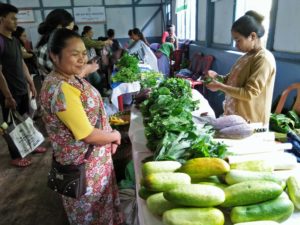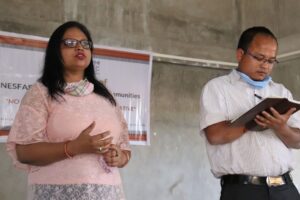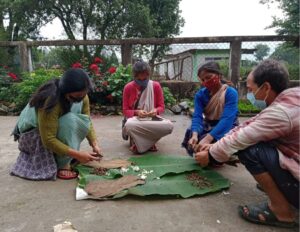 The Indigenous Partnership for Agrobiodiversity and Food Sovereignty (TIP) with support of The Pgakenyaw Association for Sustainable Development (PASD) and the Stockholm Environment Institute (SEI), Asia Office organized a sharing event on the 28th of October 2024 at the Mekong Room of SEI, Asia in Bangkok. The Meeting was preceded by a visit of the partners from Rome, Indonesia, Myanmar, Meghalaya, to Huay E Kang, a Karen village where TIP and PASD conducted the agroecological assessment of the community’s food system. PASD also organised on the 26th and 27th of October, a ROTATE Festival at Museum Siam where 7 of the Karen communities displayed their food and culture and gave an Elder and a woman Leader to share their views of their food systems through a talk session moderated by a local Thai TV presenter. Dr. Dhrupad Choudhury and Bah Phrang Roy were among the panelists.
The Indigenous Partnership for Agrobiodiversity and Food Sovereignty (TIP) with support of The Pgakenyaw Association for Sustainable Development (PASD) and the Stockholm Environment Institute (SEI), Asia Office organized a sharing event on the 28th of October 2024 at the Mekong Room of SEI, Asia in Bangkok. The Meeting was preceded by a visit of the partners from Rome, Indonesia, Myanmar, Meghalaya, to Huay E Kang, a Karen village where TIP and PASD conducted the agroecological assessment of the community’s food system. PASD also organised on the 26th and 27th of October, a ROTATE Festival at Museum Siam where 7 of the Karen communities displayed their food and culture and gave an Elder and a woman Leader to share their views of their food systems through a talk session moderated by a local Thai TV presenter. Dr. Dhrupad Choudhury and Bah Phrang Roy were among the panelists.
In his introductory remarks, Bah Phrang Roy as the Coordinator TIP said that as the world is increasingly looking towards a nature positive food systems, the food systems of Indigenous Peoples can provide unique templates of solutions to benefit people, nature and climate resilience. He said that the TAPE Study undertaken with 500 households in 4 countries has brought forward strong evidence of this claim that Indigenous Peoples are making.
Dr. Prasert Trakansuphakon of PASD praised the role of Indigenous women who have led the initiative of safeguarding Indigenous Food Systems. He agreed with the important role that Indigenous Peoples’ communities play in safeguarding global biodiversity and the need for this claim to be backed up by data. He further said that organisations should also be more proactive in sensitising National Governments to these new proven data.
Niall O’Conner of the Stockholm Environment Institute (SEI) of Asia expressed his admiration for the ingenuity and resilience of Indigenous Peoples worldwide. He shared his hope that this knowledge of sustainability can be shared and scaled globally without coming at the cost of exploiting Indigenous communities.
The welcome and introductory remarks were followed by the presentation of the TAPE assessment result which was conducted across four countries: Mexico, Kenya, Northern Thailand, and Northeast India, by Gratia Dkhar, Coordinator of the TAPE study. The study presented at the forum was also presented globally during the Rome Gathering on the assessment of Indigenous Peoples’ Food Systems that was held at UN-IFAD Headquarters in Rome on 10th October 2024.
Kong Gratia Dkhar, International TAPE Coordinator from NESFAS, shared compelling evidence on the contributions of IPFSs towards global food sustainability. She advocated the need to scale such templates of solutions offered by Indigenous Peoples and pleaded for policy frameworks that ensure the sustainability of these systems while also protecting community rights and their access to resources. She said that while undertaking the study it was found out that rain-fed agriculture is one of those orphan areas of research.
“There is an urgent need to promote the interface between local knowledge and scientific knowledge and policies, and we hope and look forward to building partnerships to put these into action.” She implored the delegates in her conclusion.
Dr. Dhrupad Choudhury, Ecologist, Indigenous Food Systems Expert and TIP Advisor followed with the presentation of the Outcome Framework which he said is the result of discussions with community members from the 4 participating countries. He said that as Indigenous Peoples’ Food systems protect biodiversity they at the same time provide opportunities for enhancing food security, improving nutrition through the diversity that is available in their systems which also provide green livelihood opportunities and build resilience to climate through the systems of reverence and nurturing of nature. He shared that IPFS can help develop food systems which are nature positive, resilient, sustainable and transformative.
Nofri Yani, former TIP fellow from Indonesia and Daniel Hayward of FAO RAP meanwhile shared their experiences of the Immersive Retreat (field trips to indigenous communities) and how living and working with indigenous communities at the grassroots level helped them see Indigenous communities at a new light.
This was followed by a session of indigenous representatives from the grassroots level sharing their messages with the delegation. Bah Richard Ranee, custodian farmer from Nongtraw village, East Khasi Hills in Meghalaya of North East India shared his experience of living and farming in a village that can only be accessed by walking 4000 steps down a steep mountain.
Bah Richard talked of the importance of shifting cultivation in his village and shared how the local biodiversity of his village provides the villagers with food as well as medicine in the form of wild edible medicinal plants. He also mentioned the important role played by women in his community who ensure that the natural resources and land are not overexploited and ensure that every household has equitable access to land.
Following this, two Karen elders of Hin Lad Nai and Nong Tao villages, Northern Thailand, Phaw Luang Chaiprasert Phokha and Siwakorn Odochao shared that for the Karen people, forests and people are interrelated and thus are one and not two different entities. They cited this connection as one of the main reasons why their communities were able to withstand the Covid-19 pandemic without any shortage of food. They advocated for the magnification of the role of women in propagating healthy indigenous food to show the younger generations how to appreciate local foods and their health benefits.
The elders also talked about the importance of pollinators in creating food security and safeguarding biodiversity and sought support for helping protect and conserve pollinators (especially bees) to maintain the rich local biodiversity that supports the food systems of their communities.
A short session on opportunities for collaboration followed thereafter where Boonsong Thansrithong of ECHO Asia suggested the idea of seed savings and seed banking from all over Asia where the best seed species could be shared with member communities. Dr. Aditya Gangadaran of The Nature Conservancy shared the idea of supporting tangible livelihood benefits that can come from the sustainable use of biodiversity through conservation-aligned livelihoods. Tara Shyam, Director REGEN10 shared that a regenerative food system should include environmental and economic outcomes, but also, very importantly, social cultural outcomes with emphasis on the people and the climate while expressing her enthusiasm in continued conversation with TIP.
This was followed by responses from the Indigenous Peoples present in the event who called for strengthening the hold on Indigenous lands by Indigenous communities for safeguarding biodiversities. Many also called for the incorporation and integration of the knowledge of Indigenous Peoples’ Food Systems into the educational curriculum for the younger generation to learn practically from a young age and also to raise awareness of the importance of IPFS.
Niall O’Conner of SEI Asia, extended an invitation for further work between SEI and indigenous communities and expressed his gratitude for the successful event while Bah Phrang Roy recapped briefly the discussions of the meeting and closed the meeting with the main findings of the TAPE results: The high performance of Indigenous Peoples Food Systems across all the ten principles of agroecology was because of the embracing social values of all Indigenous Peoples of caring and sharing and the local traditional governance that can ensure that these values are upheld. When these traditional values systems and governing processes are set aside or broken, Indigenous Peoples’ Food systems are then broken.



